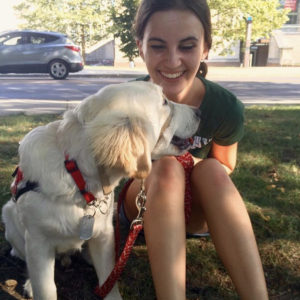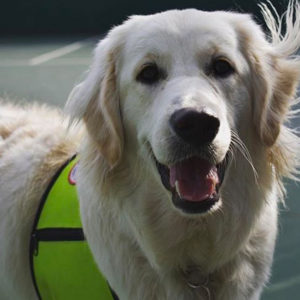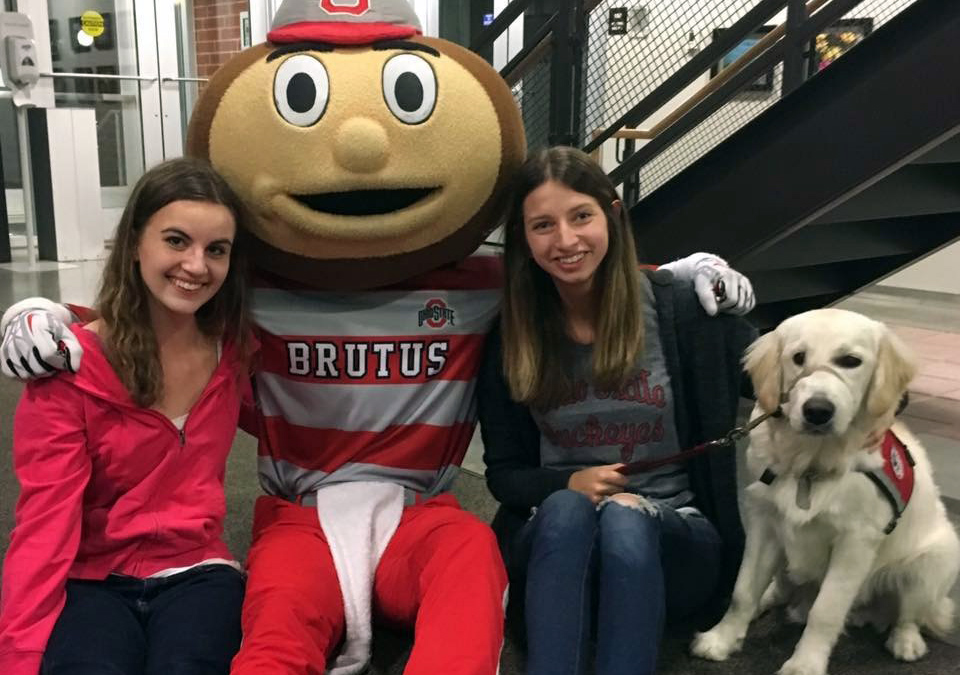I’ve always been passionate about animals, especially dogs. During my junior year of college, I was so excited to have an opportunity to raise service-dogs-in-training. Roku was my first pup—a sweet, gentle, golden Labrador puppy who never met a person or peanut butter he didn’t like!
Every Wednesday, I’d puppy-sit Roku. With a service-dog-in-training vest strapped to his back, I’d socialize him to different stimuli around campus—making him ready for anything as a service dog to a child with a disability.
Combining My Passions for Dogs and Speech Therapy

Around this time, I also applied to volunteer with The Ohio State University’s (OSU) Aphasia Initiative—a support group that provides adults recovering from TBI or stroke with a space to work on their communication skills. I discovered the opening I applied to was also on Wednesdays. Disappointed, I wondered how I could participate in both the Aphasia Initiative and watch Roku at the same time.
I’d learned about animal-assisted therapy before. The idea that the human connection to animals could facilitate communication fascinated me as an aspiring clinician. While I didn’t have the resources or connections to pioneer a large research project on the topic, I thought maybe I could combine my training with Roku with volunteering at the Aphasia Initiative.
To my great fortune, OSU’s Speech and Hearing Science Department was incredibly receptive to the idea, even offering to make Roku the Aphasia Initiative’s official group mascot!
The Roku Effect

The following Wednesday, Roku had his first day as an official Undergraduate Communication Partner! The effect of his presence was immediate. Clients and families were eager to participate, and, as the weeks progressed, Roku opened up their conversations. One client showed us pictures of his new rescue; another client, who was blind, asked other clients to describe Roku in detail. We even spent one whole morning discussing the merit of cute animal videos on YouTube—with examples, of course!
On one particular Wednesday morning, we were welcoming our newest member. The rest of the clients introduced themselves, and I will never forget when Sarah’s turn came. She gently stroked Roku’s silky fur and spoke fluently with pride: “My name is Sarah, and I love this dog.” I smiled at the puppy at our feet and felt all of the promise these words held.
As the weeks progressed, I saw a change in Roku too. His pace quickened and his tail wagged whenever we approached the clinic. Once there, he’d sit comfortably with every client, soaking up the attention—regardless of what the client said, the time it took for them to say it, or even if they could say anything at all.
A Dog’s Unconditional Love
Roku is with his forever family now, but I’ll always cherish the time I worked with him, and the lessons this experience taught me about service and leadership. Whenever I see a dog wearing a service-dog-in-training vest, I always think of Roku.
Pioneering my own passion, despite potential obstacles, provided me with some of the most impactful experiences of my collegiate career. An unconventional idea became a creative service-learning project, giving clients of the Aphasia Initiative the unconditional patience and support that sometimes only a dog can provide.


Hey, my name is Caitlin I am a graduate student at Faulkner University’s speech and language masters program and have been coming up with ideas for my thesis proposal. I have done a single case study involving 2 clients with autism using a therapy dog. I would like to survey SLPs who use therapy dogs with students with autism do you know of the best way to offer this survey to a group of SLPs?